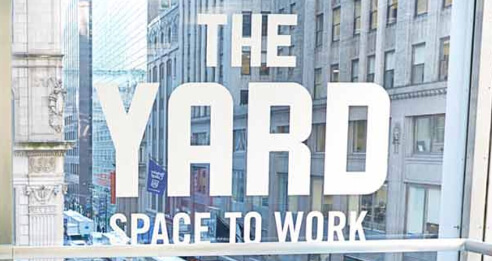
Largest Coworking Companies


It’s safe to say that the gig economy has had an impressive impact on the work environment all over the world. Freelance professionals and businesses alike have ditched the corporate aesthetic and have switched to a fresher, almost communitarian approach to the spaces they work in and run their businesses from.
In this article, we wanted to explore why coworking spaces are a great idea for a business, and why you should consider opening one.
First off, it’s important to stress how the concept of a co-working space is almost synonymous with the modern startup and gig cultures. Going freelance or starting your own business is just as good of an idea as climbing the corporate ladder in some soulless large company. And people are well aware of it.
It is far less expensive to rent an office in a co-working space than to rent your own solo office. And given the growing popularity and sophistication of these spaces today, workers appreciate the amenities they are offered that they may not have access to in a more traditional setting – a break room; one or more conference rooms for meetings with clients, and so forth.
Easily the world’s most expensive company in the coworking industry, WeWork launched as a simple office rental space in NYC’s Soho, and it has now escalated to a multibillion dollar corporation comprising over 800 currently or soon available locations. It’s been valued at a whopping $47 billion. The important thing is how confident venture capitalists are in its success. The business taps into the potential growth of the gig economy and the startup culture, along with the demand for flexible workspace.
While places like Paris have over 80 co-working spaces, making it one of the cities with the greatest demand for such businesses, there’s a lot of untapped markets when it comes to Tier 2 and Tier 3 cities.
Not only will that provide you with the opportunity to be the first business of this sort to set foot in the region, making it an easy job to get the lion’s share of the market, but the real estate market may be much less competitive than in places like Paris, New York, or Los Angeles.
In a coworking business, there is a broad spectrum of add-on services that can boost revenue . Here, it’s important to have an in-depth understanding of your customers’ necessities, but also understand what appeals to them culturally.
Just to touch on our previous example, WeWork has an impressive array of products that they offer, which are insanely successful with their target customers — craft beer, ethically sourced coffee, and furniture made of recycled components. Consumer trends show that an increasing number of people are passionate about health and wellness in the workplace, ethics, and high-quality products, which is why WeWork’s locations are so appealing to so many people.
Coworking spaces can also offer in-house IT services, like discounts on design software, development, testing, marketing, and many other things that freelancers, solopreneurs, or multi-person teams working in your space might need.
Coworking spaces can also promote their culture by providing their customers with educational opportunities, which is another great way of increasing revenue. Everything that business owners, freelancers, solopreneurs might need or be interested in — the startup culture, small and medium business strategies, content, and social media marketing, budgeting, funding, healthcare options and more.
Providing educational opportunities could be a key differentiator from the competition. More importantly, the best advertisement is word-of-mouth advertisement. Happy customers bring new customers with them. So providing them with interesting workshops, presentations and courses can often advertise your space better traditional marketing techniques.
Here it’s important to mention that this is a benefit for both the clients frequenting the coworking space and the owner of the business.
Networking is an essential component of coworking and many people choose to these flexible workspaces to interact with like-minded people, exchange experiences with professionals and entrepreneurs in their field, and find new clients.
You, as an entrepreneur, will be surrounded by very talented professionals that are versed in a variety of fields, allowing you to build meaningful business connections that have all the chances in the world to transform into other successful businesses.
An extension of the networking opportunities are the possibilities of investing in aspiring businesses. Investing in companies early gives you the opportunity to purchase shares at a rather inexpensive rate, allowing you to maximize your profits if the business becomes successful over time.
Many industry giants have started in coworking spaces. A few examples would be Instagram, Timehop, Uber, Indiegogo, and many others.
Coworking Space Management Guide
A comprehensive guide to help you manage your coworking space.
Opening a coworking space allows you to give people the opportunity to work in an environment that promotes a healthy work/life balance. People are typically happier to work in co-working spaces since they work for as much as they have to. People don’t just live on the weekends, given that coworking spaces strive to provide a vibrant and stimulating environment that promotes interaction with other like-minded people.
“Coworking” is gradually becoming an umbrella term for a variety of businesses. Here are a few new sub-categories you may have already heard of:
● Educational: Office + Courses
● Equity: Accelerators/Incubators
● Coworking for large enterprise/Business Centers
● Coworking Aggregators
● Cafes and Restaurants as co-working spaces
Whenever you feel the need to reframe your business into something new, you can always repurpose your current iteration of a coworking space into a more narrow and niche-specific one.
Ridesharing being a prime example, the sharing economy encourages the access and exchange of goods and services between two or more people. This type of business applies to a broad spectrum of principles and ideas like the Collaborative Economy, Peer-to-Peer Economy, the Gig Economy, Crowdfunding, Coworking, and Cobranding. And while many of them sound like some experimental fringe concepts, the Collaborative Economy clocked in at $15 billion in 2014 and is projected to grow to a staggering $335 billion in 2025.
The coworking business ideas has some of the greatest opportunity for growth and high demand. People in the modern business ecosystem appreciate when offered goods and services at a certain degree of flexibility. It’s safe to say that the time to start a coworking space is now.
Save your community manager 41 hours each week—learn how The Yard did it with cloud-based access control.
Read the Case StudyFree access to our best guides, industry insights and more.
